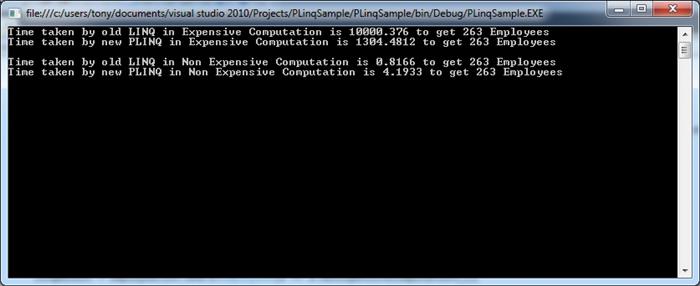Introduction
Be careful when you are using PLINQ. What I found is if the computation
is very simple and non-expensive, it is better to use LINQ than PLINQ.
Using the code
Following code is tested in multicore machine (8 CPU). First
I timed a CPU intensive code with LINQ and then with PLINQ. Then I timed NON
CPU intensive code with LINQ and PLINQ.
using System;
using System.Collections.Generic;
using System.Linq;
using System.Text;
using System.Diagnostics;
using System.Threading;
namespace PLinqSample
{
public class Employee
{
public string Name { get; set; }
public double Salary { get; set; }
public bool ExpensiveComputation()
{
Thread.Sleep(10);
return (Salary > 2000 && Salary < 3000);
}
public bool NonExpensiveComputation()
{
return (Salary > 2000 && Salary < 3000);
}
}
class Program
{
static void Main(string[] args)
{
List<Employee> employeeList = GetData();
Stopwatch stopWatch = new Stopwatch();
stopWatch.Start();
var linqResult = employeeList.Where<Employee>(e=> e.ExpensiveComputation());
int empCount = linqResult.Count();
stopWatch.Stop();
Console.WriteLine(string.Format("Time taken by old LINQ in Expensive Computation is {0} to get {1} Employees", stopWatch.Elapsed.TotalMilliseconds, empCount));
stopWatch.Reset();
stopWatch.Start();
linqResult = employeeList.AsParallel<Employee>().Where<Employee>(e=> e.ExpensiveComputation());
empCount = linqResult.Count();
stopWatch.Stop();
Console.WriteLine(string.Format("Time taken by new PLINQ in Expensive Computation is {0} to get {1} Employees", stopWatch.Elapsed.TotalMilliseconds, empCount));
stopWatch.Reset();
Console.WriteLine();
stopWatch.Start();
linqResult = employeeList.Where<Employee>(e => e.NonExpensiveComputation());
empCount = linqResult.Count();
stopWatch.Stop();
Console.WriteLine(string.Format("Time taken by old LINQ in Non Expensive Computation is {0} to get {1} Employees", stopWatch.Elapsed.TotalMilliseconds, empCount));
stopWatch.Reset();
stopWatch.Start();
linqResult = employeeList.AsParallel<Employee>().Where<Employee>(e => e.NonExpensiveComputation());
empCount = linqResult.Count();
stopWatch.Stop();
Console.WriteLine(string.Format("Time taken by new PLINQ in Non Expensive Computation is {0} to get {1} Employees", stopWatch.Elapsed.TotalMilliseconds, empCount));
stopWatch.Reset();
Console.ReadKey();
}
static List<Employee> GetData()
{
List<Employee> employeeList = new List<Employee>();
Random random = new Random(1000);
for (int i = 0; i < 1000; i++)
{
employeeList.Add(new Employee() { Name = "Employee" + i, Salary = GetRandomNumber(random, 1000, 5000)});
}
return employeeList;
}
static double GetRandomNumber(Random random, double minimum, double maximum)
{
return random.NextDouble() * (maximum - minimum) + minimum;
}
}
}Here is the result of above code

This member has not yet provided a Biography. Assume it's interesting and varied, and probably something to do with programming.
 General
General  News
News  Suggestion
Suggestion  Question
Question  Bug
Bug  Answer
Answer  Joke
Joke  Praise
Praise  Rant
Rant  Admin
Admin 






